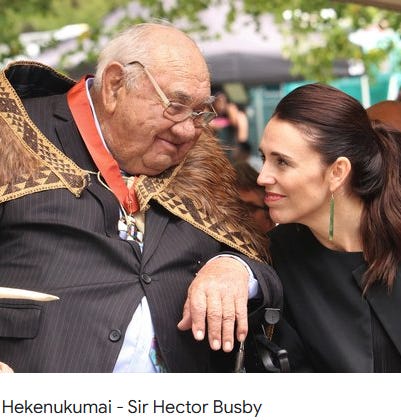Tribal threats to New Zealand’s democracy must get the chop, before it’s too late
There’s no such thing as pan-Māoridom. Never has been. Not before colonisation, and not now. “Māori” are a collection of separate tribes (iwi), which now number about 150. None of these tribes were or are democratic. The head of each iwi hierarchy is a paramount chief, the Ariki, typically an inherited status. At the bottom of each traditional Māori tribe were the slaves and baby girls.
Contrary to the boring bunkum orthodoxy, pre-colonisation Māori tribes were excitingly fluid. But we’re not talking gender fluid. Iwi fluidly invaded and colonised each other’s territories and these wars, migrations, slaughters, occasional alliances and political movements would give birth to new iwis.
Even now, new iwis can coalesce and be just plain invented. Ngāti Ruawāhia, the self-styled “Sixth Tribe of Te Tai Tokerau” (Northland), was formed in 2018 as a combo Māori/Hawaiian tribe, as a result of a friendship between deceased navigator and waka-builder Hector Hekenukumai Ngāiwi Pūhipi Busby and Hawaiian navigator Nainoa Thompson.

The latest race-based assault on New Zealand democracy comes from the Whānau Ora Commissioning Agency. Although massively taxpayer (Government) funded, the “Agency” isn’t a Government agency at all. It’s a very private company named Te Pou Matakana Limited that forms part of Māori Party President John Tamihere’s fiefdom. Tamihere, NZ’s Paramount Chief Race Hustler, pays himself a cool half a million dollars a year of taxpayers’ money as Whānau Ora’s CEO.
So let’s recognise Tamihere’s dominion for what it is…Ngāti Tamihere, New Zealand’s newest iwi. I’ve covered Ngāti Tamihere in an earlier Substack:
JOHN TAMIHERE’S MĀORI PARTY MACHINATIONS
John McLean
·4 December 2024

John Tamihere is a complex man who conducts tricky business. He’s Suzerain of his complicated extended family, the Waipareira Trust and Māori Party. He and his operatives and acolytes do a self-servicing disservice to the majority of Māori, and generally give Māori a bad name.
Read full story
With less than a fortnight left before the deadline to switch to the Māori roll for the next general election, Whānau Ora has produced a slick half hour advertisement encouraging New Zealanders with Māori ancestry to switch to the Māori roll. The campaign features showman provocateur Tāme Iti. Because Whānau Ora, as a private company, is not subject to the Official Information Act, the general public has no way to find out what monstrous sum of public money Whānau Ora spent on the campaign.

In the current political environment, with the Māori Party candidates elected to Parliament in all seven Māori electorates, the Whānau Ora’s campaign is – for all practical purposes – a brazen attempt to increase Māori Party representation in Parliament. New Zealand taxpayers are therefore funding a promotion for a particular political party, the Māori Party – the political arm of Ngāti Tamihere.
The number of Māori seats in Parliament depends on the numbers on the Māori roll. Currently, about 300,000 are on the Māori roll – which translates into the current seven Māori seats. Roughly speaking, each tranche of about 25,000 extra individuals on the Māori roll would translate into an extra Māori seat. About 50,000 more would result in nine Māori seats.

In the 2023 general election, the Māori Party received about 3% of total votes cast. Because of the Māori electorates, that 3% translated into about 5% of Members of Parliament. This is disproportional representation; the precise opposite of what New Zealand’s Mixed Member Proportional (MMP) system, introduced in 1996, was meant to achieve. And, on current settings, the more Māori seats, the greater the Māori Party disproportionality would become.
The Chair of Whānau Ora, Merepeka Raukawa-Tait, deigned to defend the campaign as innocent encouragement for Māori to vote in the next election. But her deflecting “defence” of the campaign is just more of the gaslighting (lying) nonsense that rational New Zealanders have come to expect from the upper echelons of Ngāti Tamihere. Raukawa-Tait stood for Te Pāti Māori in Rotorua electorate in 2023. “Her” Whānau Ora CEO is John Tamihere. Ngāti Tamihere, through Whānau Ora, is using public money to promote its Māori Party. It’s that simple.

Raukawa-Tait has an indefensible conflict of interest. On the one hand, she chairs a Government-funded company – Whānau Ora - that is supposed to be helping Māori families in general. On the other hand, she is abusing Whānau Ora’s Government funding in support of an activist/separatist political party – the Māori Party – that she is a member of, that is not in Government and that the vast majority of Māori do not support.

So, who can we rely on to address this mess? National Party Māori Development Minister Tama Potaka has announced, "I've asked TPK [Te Puni Kokiri - the Ministry of Māori Development] to look into the matter."
But TPK will do nothing decisive. Because TPK itself indulges in all this murky Māori nepotism, something I’ve covered in a previous Substack:
TEFLON TAURAPA
John McLean
·15 March 2024

Taurapa was formerly named Connor Taurapa Matthews. Somewhere along his slimy trail he formally changed his name to the singular & bold “Taurapa”.
Read full story
And we can’t expect the Electoral Commission to defend New Zealand democracy. The Commission’s CEO, quisling Karl Le Quesne, is the cryptic chap who allowed the Manurewa Marae to be used as a polling station in the 2023 general election, despite Takutai Tarsh Kemp being both the CEO of the Marae and the narrowly-successful Māori Party candidate in that electorate. Le Quesne tried to downplay the clear conflict of interest – ruthless exploited by Ngāti Tamihere - as a “perceived” conflict of interest. Le Quesne is also Teflon:
THE COCK ROCHE AND THE HERON
John McLean
·27 Feb

The Public Service Commission has at last released its report on the abuse of New Zealanders’ personal information in connection with Auckland’s Manurewa Marae and the 2023 general election.
Read full story
NZ First’s Shane Jones is alive to the shenanigans, commenting:
“Whānau Ora has been sadly tainted by the Māori Party ... I fear that this type of politicisation just shows that public taxpayer money historically has been used for ideological experiment. Whānau Ora has sunk to a very low ebb. Kiwis have had a guts full of how the Māori Party and Whānau Ora have worked hand in glove quite frankly to polarise and diminish the spirit of unity,"
But Jones is powerless without the support a National Party that is revealing itself to be in intimate civil union with Ethnotearoa. Minister of Education Erica Stanford’s Education and Training Amendment Bill (No. 2) will, if enacted in its current form, incorporate the following in New Zealand’s Education and Training Act (similar silliness is already in the Act):
“To meet [each school board’s paramount objective - to ensure that every student at the school is able to attain their highest possible standard in educational achievement], the board must… ensure that the school gives effect to Te Tiriti o Waitangi, including by…achieving equitable outcomes for Māori students…working to ensure that its plans, policies, and teaching and learning programmes reflect local tikanga Māori, mātauranga Māori, and te ao Māori…[and] taking all reasonable steps to make instruction available in tikanga Māori and te reo Māori”

All students, Māori or not, must be subjected to “local tikanga Māori, mātauranga Māori, and te ao Māori”. And “Māori students” is not defined. Who are they? It’s a legitimate question, given only “Māori students” are entitled to special “equitable outcomes”. Does 1/64th Māori ancestry count? (No genetic test is available to determine whether an individual has Māori ancestry.) Is cultural affiliation sufficient, in this Cultural Marxist Māori Matrix?
Takutai Tarsh Kemp’s sad death has triggered a by-election in the Tāmaki Makaurau Māori electorate. Who will contest the by-election? Will Labour MP Peeni Henare once again throw his hat into the ring? Henare as the victim of Ngāti Tamihere’s Manurewa Marae skullduggery, when Kemp defeated Henare by a mere 42 votes. Will the Māori Queen of Ngāti Tamihere, Merepeka Raukawa-Tait, have yet another tilt at entering that hotbed of colonial oppression, New Zealand’s Parliament?

Ngāti Tamihere is on the war path and will never back down. There is nil prospect of New Zealand’s newest iwi surrendering, or of a lasting peace deal. If Aotearoa’s newest iwi isn’t defeated, New Zealand’s democracy will be eaten alive.
Whānau Ora should be defunded. And the current Government should end the distorting anachronism of the Māori electorates, with the backing of a national referendum. On a per capita basis, Māori are already over-represented in Parliament – and good for them. As a salve to the Māori separatists, the 5% party vote threshold should be reduced to 4%. If the Māori Party can’t get 4% of New Zealanders to vote for them, they don’t deserve to be in Parliament.
Plus, settle with Nga Puhi and shrink the Waitangi Tribunal. Preserve some shrunken heads, for posterity. End all this anti-democratic racialism.
John McLean is a citizen typist and enthusiastic amateur who blogs at John's Substack where this article was sourced.


6 comments:
Seems the Whanau Ora expenditure analogous to Morgan's silk underpants.
As I said in a previous comment, left-wing parties are tenacious in their pursuit of power. I refer to France and Canada. My guess will be that the next step will be to allow or encourage people(supporters) with minimal Maori ancestry to register on the Maori roll. At the present time, criteria for Maori status is extremely murky. I think if you "feel Maori" that's enough. I am loathe to say this, but unless the coalition act before the next election a right-wing party in the future will become a pipe dream. I doubt the coalition will act before the next election. ACT and NZF would possibly. Most politicians seem gripped in the "wonderfulness" of all this. Erica Stanford, a case in point.
Ngati government crime syndicate works hand in glove with Ngati Maori mafia.
I was (somewhat) relived to get the following information from Act's newsletter this morning re the offending section of the ETA:
"Section 127 will be reviewed as part of the Government’s wider review of Treaty clauses.
Free Press has it on good authority that ACT argued to just remove it now. If a bill is being passed, just include the deletion in it. ACT settled for a deal of having this section explicitly included in the wider review. That is the reality of coalition Government.
We now expect that the Education Bill will pass this year, and a new bill reviewing all Treaty clauses will be introduced to Parliament early next year and passed before the election."
But poor Erica has not understood this - or even communicated such.
Clearly this form of democracy has failed, it's too open to undemocratic manipulation. Time for a reset to a one person, one vote Westminster based democracy.
Post a Comment
Thank you for joining the discussion. Breaking Views welcomes respectful contributions that enrich the debate. Please ensure your comments are not defamatory, derogatory or disruptive. We appreciate your cooperation.